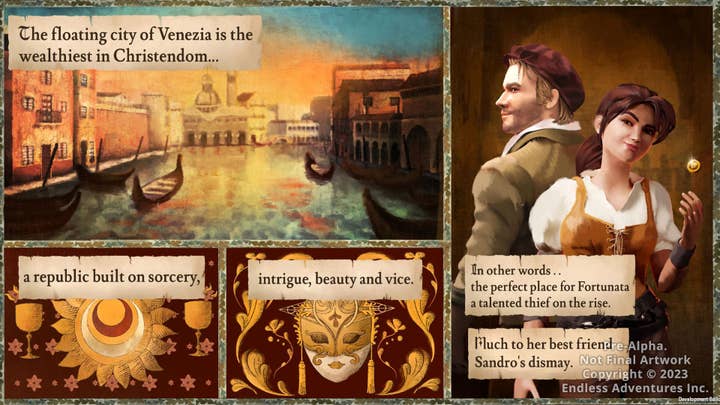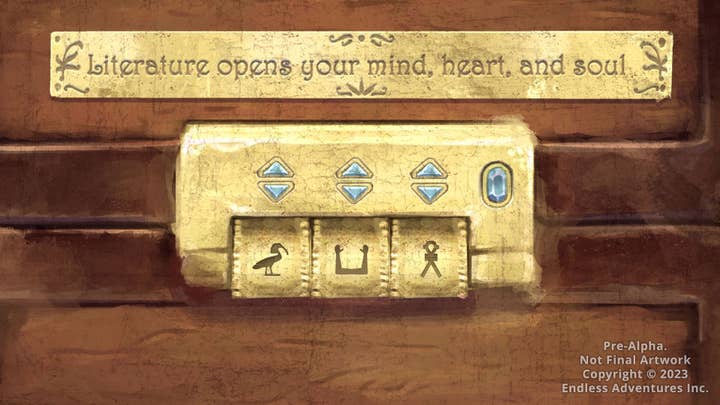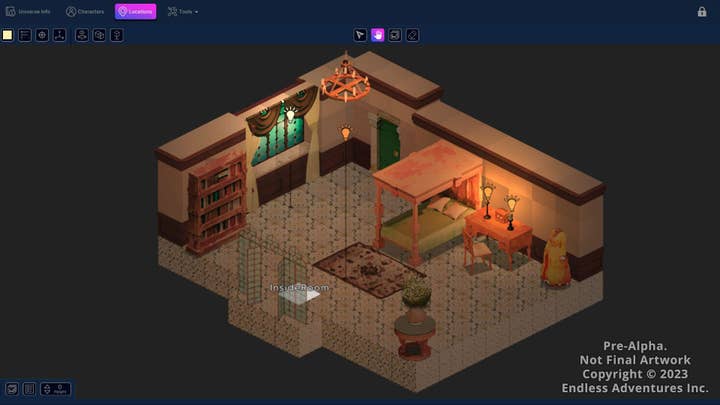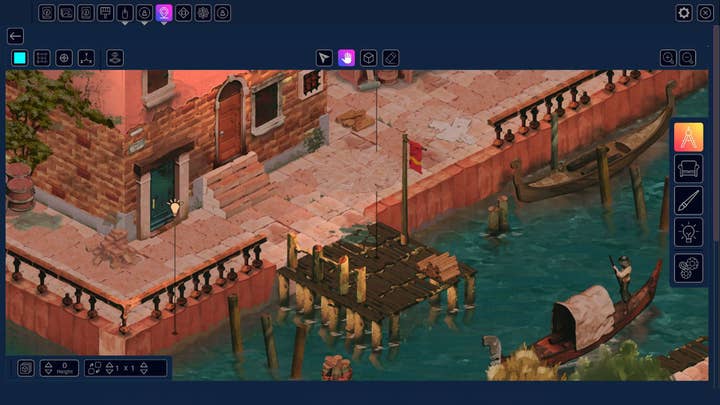Code your own adventure, without code
Jordan Weisman talks about applying the Roblox model to narrative-game-making software with Adventure Forge, and the industry's evolution on M&A
Jordan Weisman has a lengthy entrepreneurial history in both tabletop gaming and video games. In the physical realm, he started FASA Corporation (Shadowrun and BattleTech) as well as Wizkids (MageKnight, HeroClix).
In video games, he started FASA Interactive (MechCommander, Crimson Skies), Virtual World Entertainment (BattleTech Center location-based entertainment), and Harebrained Schemes (Shadownrun Returns, The Lamplighters League).

Speaking with GamesIndustry.biz, Weisman says his latest endeavor, Endless Adventures, merges the two threads of his career in a different way than simply using brands from one in the other.
"In video games, I've always been the storyteller," Weisman says. "If you're leading the creation of a video game, you're leading a team to tell a story and you make that game and those arcs very carefully.
"In tabletop, I've been the platform for stories to be told. When we create Shadowrun, or BattleTech, or these other universes, we help create a setting that gets people excited. We help create characters and give examples of stories that are told in that world. But then really, we hand over the storytelling stick to the players and they create the stories that our meaningful to them."
With Adventure Forge, the first project from Endless Adventures, Weisman is bringing those two things together.
"We're stepping out of the role of storytellers, but we're using the technology to empower the audience to tell the stories," Weisman says.
Adventure Forge is a user-generated content platform for building narrative-focused games without needing to be able to code. It also will come with Tales of Fortunata, which Weisman likens to a sourcebook in a tabletop RPG as it's an IP and a setting filled with colorful characters, but one that primarily exists to inspire his own customers and let them tell their own stories.

"Over the 40 years of my career and at many game studios that's encompassed, I've designed many toolsets for our internal use," Weisman says. "And the reason I've always been very tool-focused is because even within a professional studio, iteration equals quality. The more designers and artists can quickly iterate their work, figure out where it's failing, test it, improve it, the better the quality of the product's going to be.
"The reason I've always been very tool-focused is because even within a professional studio, iteration equals quality"
"And when you have an engineering component to that loop, it by nature slows it down because engineers are pretty prized and hard to get hold of inside a larger studio. And you've got this transference of design intent that goes from the designer to the engineer and back to the designer and it becomes a longer and longer loop.
"So I've always tried to find ways to empower the design team independently, and that's where this project started from. It's like War Games, how do we get humans out of the loop? [laughs] How do we get engineers out of the loop for designers? And that meant trying to figure out how designers could express logic."
Weisman spent two years working on that problem with a small engineering team before settling on Adventure's Forge's approach, which Weisman describes as "a set of highly contextual drop down menus."
He likens it to Mad Libs, saying the language-based approach is an easier way to effectively communicate what's happening in a game than a complex graphical web.
"This gives the designers pretty much the same power as an engineer to create sophisticated logic, but now I don't need to learn any syntax to do that," he says.
While Adventure Forge is intended to create narrative-focused games, Weisman says that basically means creators shouldn't expect to make a first-person shooter with it, but it's still adaptable enough to handle hidden object games, puzzle games, and things like chess.

As for the business model, it's a twist on Roblox.
Creators will purchase the Adventure Forge creation tool upfront for a fee, and can choose whether to monetize whatever it is they make with it. If they do, Endless Adventures will take a cut of the proceeds.
However, the end customers won't need to pay for Adventure Forge. They can download the platform for free and only need to pay if the creator of a given game is charging for the experience.
"We will also be looking at what is published in the ecosystem," Weisman says, "identifying things that are really connecting, and then work with those creators to spin them out as standalone applications and games, which allows us to put that title on a wider array of platforms and devices appropriate for the game that's been created."
"We will also be looking at what is published in the ecosystem, identifying things that are really connecting, and then work with those creators to spin them out..."
Given the headaches over moderation that Roblox has encountered with its model, we ask Weisman how Endless Adventures is handling the same subject.
"It's something the tabletop RPG space has had forever, but the exposure of that is extremely limited," Weisman notes. "If I'm a games master and I've taken Shadowrun and created an abhorrent version of Shadowrun, only my players at the table will ever see that. So it's a self-selecting audience and very small exposure. Here's obviously it's a larger platform, so moderation is a much bigger deal."
Endless Adventures' solution at the moment is a two-tiered approach "with really bad names right now."
Weisman says the Adventure Forge platform will effectively have two storefronts: 'Civilization' and 'Wild West.' Civilization will be a curated content store with vetted materials that creators have submitted for inclusion. That vetting will be done with a combination of algorithmic and human review, and will be focused not on how good an experience is but on objectionable content.
The Wild West, on the other hand, will be "more like every other UGC space," Weisman says. Like Twitter or Instagram, there's nothing to stop people from posting reprehensible material, but other users can flag it and the platform can either take it down straight away or issue a changelist to the creator of amendments that must be made for it to remain available.
"It's a delicate balancing act when we're talking about narrative games because you want people to have the ability to express a spectrum of emotions and talk about difficult subjects, but you also want to make sure you're doing it in an appropriate context," Weisman says.

Given Weisman's history of having sold four of his previous start-ups and the wave of recent M&A-related news in the industry – from Microsoft's Activision Blizzard deal to Embracer's hangover after a years-long acquisition bender – we ask the developer what he sees when he looks at the headlines.
"Acquisitions have always been part of the lifecycle," Weisman says. "And as entrepreneurs, depending on what kind of company you're building, they're often the end game you're looking for. Most game studios are not positioned to go public. That's just not a scale or a skill set that makes sense for game studios. And if you've had investors in your studio to help you grow it, they're looking for a return on investment and acquisition is the most likely form of that.
"Even if you have a highly successful studio that's cash flowing great, cash flow is not of interest to VC. They actually can't deal with that. When they close out the fund, they have to close out all the investments in it, and so it's unlikely they want to just keep going with a good cash flowing company.
"There are good acquisitions and bad acquisitions, and a lot of it comes down to really understanding the culture of the two companies, making sure you're aligned on the audience you're speaking to, how you're speaking to them and how you're monetizing them because bad alignment will generate really bad outcomes. But good alignment can really be a win-win."
Weisman himself has previously been vocal about how a bad acquisition can tank a company, telling us in 2009 that FASA Interactive was "destroyed right in the beginning" after Microsoft acquired the company in 1999.
But that was a quarter century ago. Surely the industry has learned a thing or two and gotten better about managing mergers and acquisitions in the time since?
"It's kind of like a snake that gets bigger and then regurgitates, gets bigger and then regurgitates, and just goes back and forth"Weisman, on the industry cycle of acquisitions and divestments
"I think we are," Weisman says. "But it's always been a cyclical industry. Publishers work with independent developers. Independent developers generate success. Publishers go, 'We're paying so much money to that independent developer; we should acquire them and stop paying them that money.' So they acquire them and bring them inside.
"It's kind of like a snake that gets bigger and then regurgitates, gets bigger and then regurgitates, and just goes back and forth. It's been that cycle forever. And I don't see that changing. That's just human nature meets capitalism and a combination of long-term and short-term planning from larger companies. So I think you'll see that expansion and contraction continue forever."
That said, Weisman notes that the industry is 20 years more mature now and people have a better understanding of how games get created, and how that differs from the tech products or movies that were the main business of acquiring companies in historical industry cautionary tales.
"That knowledge is now much broader held, and I think much more knowledgeable people who have built game studios are in positions in those larger companies so that the integrations are more thoughtful and have been more preservant of the cultures of success," Weisman says.
"The culture of a studio really is the generator of success. If you try to just buy the IP and assume you can bump it over to another team and they'll be just as successful with it, that's a real roll of the dice. Sometimes their fresh take will bring whole new life to an IP. But often they just can't."
Sign up for the GI Daily here to get the biggest news straight to your inbox






.jpg?width=291&height=164&fit=crop&quality=80&format=jpg&auto=webp)


